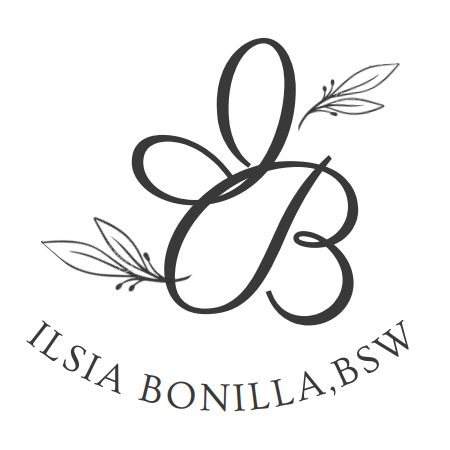Somos Unidos (We are United)
 Introduction
Introduction
Location/Agency: The Dalton Academy- Dalton, GA
Duration: 45 minutes, 2x a month
Participants: Newcomers (Students with limited-english speaking ability) in 9th-12th grade
*Disclaimer: This project was initially discussed in Dalton Public Schools in Dalton, GA. Due to unforeseen circumstances, this project did not take place at this location. Somos Unidos will be implemented in my current work setting.*
About: Somos Unidos is an evidence-based support group for newcomers. The goal of this support group is to build community and connect new students with resources.
What social issue has been addressed and why?
Schools in north eastern Georgia has experienced a vast increase of immigrants from Spanish speaking countries. The majority being from Guatemala and Mexico. Due to the U.S Compulsory Education law, many underaged immigrants have been enrolled in public schools with limited-english speaking ability and a culturally diverse background. Dalton Public Schools, specifically The Dalton Academy has a large hispanic student body population. In their most recent data shown on their website, 75% of the student body are hispanic with 37% being English language learners. It is clear that there is a significant growing population of newcomers and students adjusting to the culture of the environment. Dalton Public Schools started the Newcomer Academy started in the 2014-2015 school year to help new-to-country students learn English and receive the necessary academic support to transition to the traditional classroom. This was a great way to help students adjust to a new school environment and be surrounded by similar students. The Newcomer Academy only allowed students to be a part of this program for one to two years depending on the student’s performance. I found that students who were once a part of the Newcomer Academy were still struggling with outside stressors that interfered with their academic success. Introducing Somos Unidos, allows students to continue to be connected with their peers and also address their obstacles while connecting them to the community.
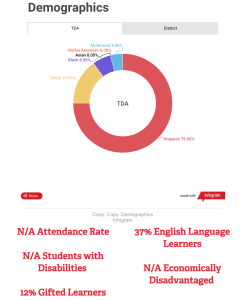
One of the past social workers in Dalton wished to initiate a similar project in Dalton High School but the COVID-19 pandemic interfered with the outcome. I have now carried on that mission and adjusted it to meet the current needs of the students in Calhoun City high school. I have introduced the idea to current co-workers and all were receptive. The high school’s clinician will be moved to the primary school this school year but she has stated that she wants to be involved. Many of the potential students suggested were he previous clients.
What interventions have been designed?
I will be gathering key interventions that will be established in the curriculum. There will also be room for a few other topics that the students can request as a group. Two key interventions in the program can be found in the S.E.L.F curriculum workbook. The two interventions are based on cultural identity and social problems such as bullying. Bloom and colleagues (2021), express how being educated on what trauma is can help humans recover from trauma.
From my experience, I have met several newcomers who have experienced a form of trauma when entering this country. So, it is important that they surround themselves with positive influences that can help them build resilience. Ostaszewski (2020), states that a supporting factor in increasing positive mental health in students is a supportive school environment. The amount of time a student spends in school is significant, so it is evident that the level of school support can impact a student’s engagement and mental health. Alan Meca and colleagues (2017), support the intervention of educating students on cultural identity. Research shows that Hispanic adolescent immigrants have a high risk of experiencing low self-esteem, depression, and confusion which may lead to negative behaviors during development. By helping students be confident in their cultural identity, students may have a greater chance at experiencing positive mental health.
The social learning theory supported my understanding of this project proposal. This theory suggests that humans learn social conduct through observational learning, where individuals learn social norms through watching a model and replicating their behavior (McLeod, 2011). Attempting to replicate behavior along with adjusting to a new country, can be confusing and frustrating. This is why I am pursuing Somos Unidos to provide additional mentors/role models so students have a greater chance at replicating positive behaviors they observe within the group.
What were some of the results achieved?
This project was not implemented therefore, results have not been produced. Once implemented in Calhoun City high school, results will be posted. I plan on implementing this program in spring 2024. I will be connecting with the Family Engagement Coordinators who have strong ties in the community and with the families. I have already made plans to reach out to Spanish churches in the area to build community and have financial support. Many of the staff and community members I have connected with had positive reactions and look forward to seeing it implemented.
I have been introducing myself and my abilities to the school to build rapport and gain further support when I introduce Somos Unidos. Recently, I participated in the first Spanish morning announcements at Calhoun City high school along with the Spanish teacher Mrs.Solis. There were many positive reactions and I gained new connections throughout the school.
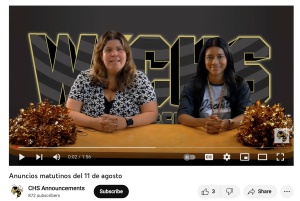
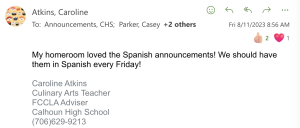
Conclusion
Although this project was not implemented in Dalton Public schools, I have been working on introducing it to Calhoun City high school. Since this transition, I have been building rapport with all staff and the surrounding community. Time and relationships have been a limitation to pursuing this project.
The unexpected outcome of this project allowed me to spend more time on adjusting my material. Before my first program proposal meeting with The Dalton Academy staff, my task supervisor resigned from her position. I no longer had contact to that school but I was able to address a need in Park Creek elementary by leading several attendance review team meetings.
Competencies
- Competency 1: Ethics and Professionalism
- I initiated this program proposal to my field instructor and staff once I built rapport with them.
- I was prepared to introduce this project in a professional way and followed the guidelines in the school district to implement new clubs/activities.
- Competency 2: Diversity
- By educating the students on community resources, I am empowering them to become confident in their ability to adjust to their new environment.
- By spreading awareness of Somos Unidos, I am acknowledging and addressing the vulnerable population. This is my way of advocating for this group by uniting them and expressing the collected concerns and lack of resources to the community/school.
- Competency 3: Human Rights
- During the group sessions, I will present myself as a learner. Although I may also be hispanic, I understand the cultural differences among the hispanic community.
- I will be inviting and encouraging other staff members with a different cultural background to experience the session with the group.
- Competency 4: Research
- All interventions used are supported with evidence-based articles. I will continue to review the most current data to implement appropriate interventions. I also have been keeping up with current issues that rise within the community by collaborating with the Gordon Prevention Initiative. (Drugs, diseases)
- Competency 5: Policy
- Per school regulations, I must have parental consent for participants under 18 years old. I have created a Somos Unidos Permission Slip form for students to get signed by their guardian/parent.
- I understand that I must have these permission slips collected before any student can participate.
- If a student discloses any planned intent to harm themselves or others I must be ready to report it to the appropriate authority. I must also report any unlawful activity that I overhear or come across during these sessions.
- Competency 6: Engagement
- I will continue to engage with the school at a micro, mezzo, and macro level. I will be building relationships with my students and introduce myself as supportive adult. I will also be building rapport with the supporting staff as they are essential in any school activity. Continuing to serve the community and learning the current organizations that serve the same population can help with future collaborations.
- Competency 7: Assessment
- I will have all group members submit an Somos Unidos- Intake Form to identify specific common challenges students face. I will then, add some topics to the curriculum. This intake form is in English and Spanish.
- Competency 8: Intervention
- I will be using evidence-based interventions from the S.E.L.F curriculum workbook.
- If students collectively request a specific topic, I will address their need with an appropriate evidence-based intervention.
- Competency 9: Evaluation
- I plan on using the form below to evaluate the effectiveness of the support group. This will allow me to make adjustments in order to cater to the target audience. It is important that I do this every year to ensure that the appropriate resources and interventions are implemented. The results of the evaluation can help support the program transition for the next school year.
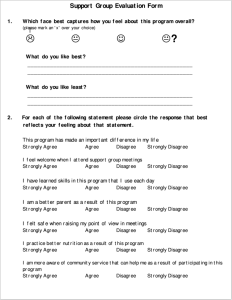
Reference
Bloom, S., Foderaro, J., & Ryan, R. (2021). S.E.L.F A Trauma-Informed, Pychoeducational Curriculum . Community Works.
McLeod, S. (2011). Albert Bandura’s social learning theory. Simply Psychology. London.
Meca, A., Sabet, R. F., Farrelly, C. M., Benitez, C. G., Schwartz, S. J., Gonzales-Backen, M., … & Lizzi, K. M. (2017). Personal and cultural identity development in recently immigrated Hispanic adolescents: Links with psychosocial functioning. Cultural diversity and ethnic minority psychology, 23(3), 348.
Ostaszewski, K. (2020). The importance of resilience in adolescent mental health promotion and risk behaviour prevention. International journal of public health, 65, 1221-1222.
